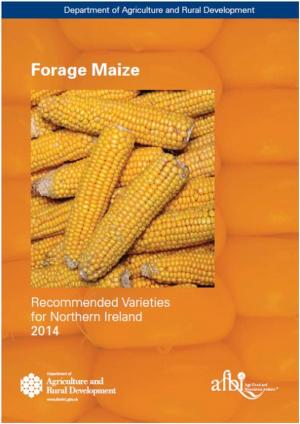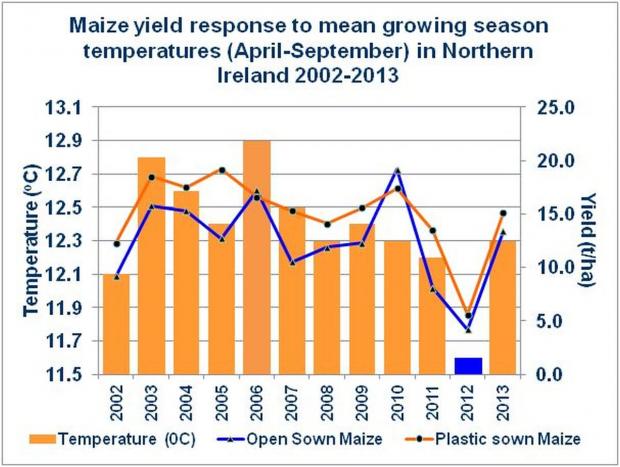Maize varieties sown by the Agri-Food and Biosciences Institute (AFBI) Crossnacreevy in 2013 gave performances that were similar to the average of the past nine years (2002-2010). This may not sound like good news but it was a massive improvement for open sown varieties compared with 2011 and especially with 2012. For plastic sown varieties, yields were much better than in 2012.


33-35% of the long-term average.
In contrast, during 2013 Northern Ireland experienced a record high temperature for the month of July (average of 17OC). This helped to compensate for the poor start to the maize growing season and resulted in an overall “average” temperature for the growing season with yields that were consistent with the long-term average for the crop in AFBI trials.
Obviously, a poorer year will produce a weaker crop but a stronger variety will not be as susceptible to poor conditions. On the other hand a good year, especially a warm June, will allow these varieties to make the most of their breeding credentials and produce a bonus production of high total yields with very high starch and energy contents. This is a very valuable source of home grown forage that is not only cost-efficient but is also a fully traceable feed stock. This is a quality factor in milk and meat production that is regarded very favourably by consumers and can attract a premium from supermarket buyers.
Forage maize is a very important crop on a global scale and there is a vast number of varieties available in commerce and large numbers of new varieties being bred each year. However, the Northern Ireland Recommended List contains a relatively short list of varieties that AFBI scientists have selected as suitable for our local growers. This is because forage maize is a sub-tropical species and is naturally adapted to much hotter climates than our own. So the AFBI variety trials are a critical first step in the success of this crop locally.
The vast majority of varieties that are bred are wholly unsuitable for our north-western, maritime climate. It is only because AFBI scientists now understand the critical attributes that adapt varieties to cool conditions, that they can identify likely suitable candidates. By then putting them through full on-farm performance tests here in Northern Ireland, our local growers can successfully grow forage maize that both yield well and also dry down to give high starch yields and metabolisable energy levels.
The bold type varieties on the Recommended List are the ones that have been successfully grown in AFBI trials for at least four full growing www.afbini.gov.uk/reclists seasons and are those that AFBI scientists are most confident about in relation to their performance potential. The key yield attributes of these varieties in terms of tonne per ha of dry matter (DM) are:
For Plastic Mulched crops: High starch yield (target of 5.6 t / ha), High dry matter yield (target of 15.2 t /ha DM), High ME yield (target of 167 GJ ha).
For Open Grown crops: Early maturing potential to achieve high DM content (target 30% plus), High starch yield (target of 3.2 t / ha), High ME yield (target of 137 GJ/ha).
by Dr Eamonn Meehan & Dr Trevor Gilliland, Plant Testing Station, AFBI-Crossnacreevy
Notes to editors:
AFBI carries out high-quality technology research and development, statutory, analytical, and diagnostic testing functions for DARD and other Government departments, public bodies and commercial companies.
AFBI's Vision is “Scientific excellence in Northern Ireland … serving the world”.
All media enquiries to AFBI Press Office
Latest news
- AFBI issues Nematodirus warning – Spring 2025 11 April 2025
- Managing Nature Based Risks to the UK Economy and Opportunities for Green Finance 08 April 2025
- AFBI Hillsborough host AERA committee 27 March 2025
- The Omics Days Conference 27 March 2025
